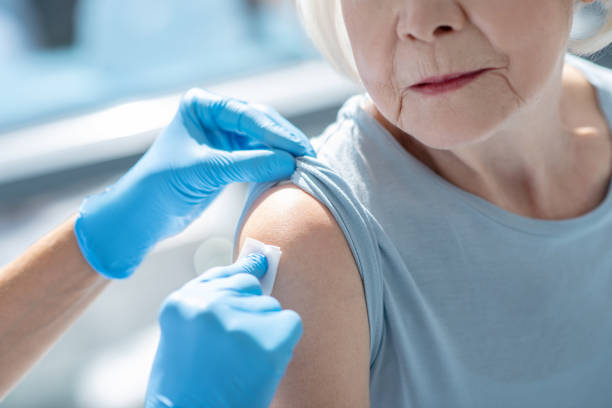 |
| Zinkevych / iStock |
A pair of new studies in Morbidity and Mortality Weekly Report highlight low influenza, COVID-19, and respiratory syncytial virus (RSV) vaccine coverage in US adults, including those in nursing homes, this fall.
The US Centers for Disease Control and Prevention's (CDC's) Advisory Committee on Immunization Practices (ACIP) recommends that everyone aged 6 months and older receive an updated COVID-19 vaccine and an annual flu vaccine. It also recommends that all nursing home residents aged 60 years and older receive a single lifetime dose of RSV vaccine.
35% and 18% vaccinated against flu, COVID
For the first study, investigators from the CDC analyzed data from the National Immunization Survey-Adult COVID Module, a random phone survey that tracks flu, COVID-19, and RSV vaccination uptake in US adults as of early November. The team also interviewed unvaccinated participants about their intent to receive the vaccines.
By November 9, 34.7% of adults reported having received a flu vaccine dose, and 17.9% had received an updated COVID-19 vaccine for the 2024-25 respiratory virus season. A total of 39.7% of adults aged 75 years and older and 31.6% of those aged 60 to 74 at high risk for severe RSV had ever received an RSV vaccine.
Uptake varied by jurisdiction and demographic characteristics and was lowest among younger adults and those with no health insurance.
"Health care providers and immunization programs still have time to expand outreach activities and promote vaccination to increase coverage in preparation for the height of the respiratory virus season."
Despite low vaccine coverage, 35% of adults said that they definitely or probably would receive or were unsure about receiving the flu vaccine, and 41% said the same about the COVID-19 vaccine, meaning they hadn't ruled out vaccination. Forty percent of adults aged 75 years and older reported that they definitely or probably would receive or were unsure about receiving the RSV vaccine.
The proportion of respondents who said that they probably or definitely wouldn't be vaccinated was highest for COVID-19 (41.6%) and lowest for RSV (20.3% among those aged 75 years and older and 14.8% among those aged 60 to 74). --->READ MORE HERE
 |
| ISTOCK / GETTY IMAGES PLUS |
A majority of Americans are not planning to get a COVID-19 booster vaccine this season, according to a survey.
The Pew Research Center's survey of 9,593 U.S. adults, conducted between October 21 and 27, found that 60 percent said they would "probably not" get an updated vaccine shot. Twenty-four percent said they likely would get an updated vaccine, while 15 percent said they had already received one.
The survey also asked people why they weren't getting a booster, and 61 percent said the major reason was they didn't think they needed it. Sixty percent listed concern about side effects as a major reason, while 26 percent said a major reason was aversion to vaccines in general. About 1 in 5 people listed these factors as a minor reason for deciding to not get a booster.
These results were remarkably similar across most age groups, except people over 65. Among 18- to 29-year-olds, 62 percent said they probably wouldn't get an updated vaccine, while 66 percent of 30- to 49-year-olds, 62 percent of 50- to 64-year-olds and 45 percent of those over 65 answered the same.
Democrats were much more likely to get a COVID booster shot, with only 37 percent saying they likely wouldn't, 39 percent saying they would and 23 percent having already received one. Republicans, on the other hand, were much less likely to get the jab: 81 percent said they likely wouldn't get a booster, with only 11 saying they would and 7 percent saying they already had.
The Pew Research Center said this bipartisan pattern is consistent with data it collected throughout the pandemic, which showed that Democrats were more likely than Republicans to be up to date with their COVID vaccinations.
The COVID-19 vaccine works by training the immune system to recognize and fight SARS-CoV-2, which is the virus that causes COVID-19. These vaccines use messenger RNA (mRNA) to instruct the cells to produce a harmless piece of the virus's spike protein, which is the part of the virus that allows it to infect human cells.
The body's immune system recognizes the spike protein as foreign and starts producing antibodies to fight it, as well as activating T cells, which help destroy infected cells and coordinate a long-term immune response. The immune system therefore remembers how to recognize and attack the virus if you're exposed to it in the future, providing you protection against infection. --->READ MORE HEREFollow links below to relevant/related stories and resources:
4 Your Health: Pandemic drinking hit women hardest
Covid Can Raise the Risk of Heart Problems for Years
USA TODAY: Coronavirus Updates
WSJ: Coronavirus Live Updates
YAHOO NEWS: Coronavirus Live Updates
NEW YORK POST: Coronavirus The Latest
If you like what you see, please "Like" and/or Follow us on FACEBOOK here, GETTR here, and TWITTER here.

No comments:
Post a Comment